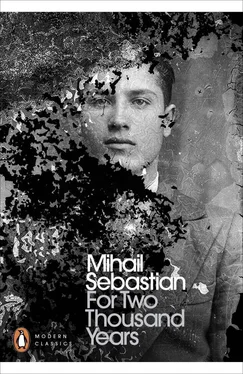The dignity that solitude affords is gone. The vice has been cured, perhaps. We’re going to remember our natural obligations and will live thrown together with our fellows. Some will be crushed, others saved, as we are pell-mell ploughed back into the savage order from which we once fled as individuals. Who knows? Perhaps a field that for decades has yielded only special plants — chrysanthemums or tubers — needs a furious outbreak of weeds, nettles, henbane and wild laurel for it to regain its fertility. The season of bitter plants has come.
For too long I have played on the stage of lucidity, and I have lost. Now I need to accustom my eyes to the falling darkness. I need to contemplate the natural slumber of all things, which the light calls forth, yet also causes to tire. Life must begin in darkness. Its powers of germination lie hidden. Every day has its night, every light has its shadow.
I cannot be asked to accept these shadows gladly. It is enough that I accept them.
*
To surrender to the wind and the rain, to submit to the coming night, to lose yourself in the passing crowd — there is nothing more restful. I will no longer seek the path that leads me to myself. But nor can I expect horizons now hidden to arise out of nothingness. Despair is a sentiment I have long suppressed, knowing how oppressive it is in a Jewish sensibility. I will not go back to the ghosts I have left behind. Is a ‘new dawn’ on the way? It surely is. But until then, the dusk will be slowly gathering over all I have loved and love still.
I will build the house at Snagov. I have to. If necessary, even if Blidaru does not wish me to. I have to build a house of gracious, simple lines, with great windows and an open terrace — a house for sunlight.
I have spoken at length with the professor and, though he is unconvinced, he will consent. I have asked him for full freedom to decide and to work. He has sworn he will not set foot there until I give the word.
Ştefan Pârlea always talks of the great historical conflagration that is drawing ever closer. Very well, then. I will have something to offer up to this conflagration.
I was on my way to the workshop, to meet the master. We seldom see each other now I’ve begun work at Snagov. I decided to go to town no more than once a week, on Saturdays. I’d have trouble finishing by September otherwise.
At the corner, towards Boulevard Elisabeta, was a group of boys selling newspapers. ‘Mysteries of Cahul! Death to the Yids!’
I have no idea why I stopped. I usually walk calmly by, because it’s an old, almost familiar cry. This time I stopped in surprise, as if I had for the first time understood what these words actually meant. It’s strange. These people are talking about death, and about mine specifically. And I walk casually by them, thinking of other things, only half-hearing.
I wonder why it is so easy to call for ‘death’ in a Romanian street, without anyone batting an eyelid. I think, though, that death is a pretty serious matter. A dog crushed beneath the wheels of a motor car — that’s already enough for a moment of silence. If somebody set themselves up in the middle of the street to demand, let’s say, ‘Death to badgers’, I think that would suffice to arouse some surprise among those passing by.
Now that I think about it, the problem isn’t that three boys can stand at a street corner and cry “Death to the Yids’, but that the cry goes unobserved and unopposed, like the tinkling of a bell on a tram.
Sometimes, sitting alone at home, I realize I can suddenly hear the ticking of the clock. It has been beside me all along but, either because I wasn’t paying attention or because I’m accustomed to it, I don’t notice it. It has got lost, along with many other familiar little noises, in a kind of silence that swallows the sound of things around you. Out of this stillness, you get suddenly caught off-guard by the clock ticking with unsuspected violence and energy. The ticks strike in short, clipped beats, like the blows of tiny metal fists. It’s not a clock any more, it’s a machine gun. The sound covers everything, fills the room, grates on your nerves. I hide it in the wardrobe — it resounds even from there. I smother it beneath a pillow — the sound continues, distant and vehement. There’s no cure but to resign yourself. You have to wait. After a while, by some miracle, the attack is over, the cogs settle down, the second hand relaxes. You can no longer hear it: the ticking has blended back into the general silence of the house, merged with the general hum of all the other objects.
Exactly the same thing happens with that age-old call for death, which is always present somewhere on Romanian streets, but audible only at certain moments. Year after year it resounds in the ear of the common man, who is indifferent, in a hurry, with other things on his mind. Year after year it rumbles and echoes in street and byway, and nobody hears it. And one day, out of nowhere, behold how it suddenly pierces the wall of deafness around it, and issues from every crack and from under every stone.
Out of nowhere? Well, not really. What is required is a period of exhaustion, of stress, of tense expectancy, a period of disillusionment. And then the unheeded voices are audible again.
*
In Snagov, on the site, on scaffolding, among workmen, amid stones and cement and girders, there are no problems. The problems begin once I return to the city.
Something has happened in recent months. Some invisible mechanism which allows people to keep going has broken down. I see only exhausted people, I meet only those who have given up. The revolution was on its way, but did not arrive. The episode at the two Uioaras was a brief outburst, a lick of flame.
They had been saying: ‘This is the end of everything — here’s where it all begins.’ But here we are, nothing has ended, nothing has begun.
St George’s day is long past. The hangings Pârlea envisaged for the holy day have not materialized. All the appointed days have come and gone, all the deadlines have expired.
Something must be done for those at the end of their tether, fresh prospects are needed for those frustrated expectations.
A few boys on a street corner cry out ‘Death to the Yids’. It’ll do, for now.
*
It is extremely difficult to follow the progressive hardening of enmity from one day to the next. Suddenly you find yourself surrounded on all sides, and have no idea how or when it happened. Scattered minor occurrences, gestures of no great account, the making of casual little threats. An argument in a tram today, a newspaper article tomorrow, a broken window after that. These things seem random, unconnected, frivolous. Then, one fine morning, you feel unable to breathe.
What is even harder to comprehend is that nobody involved in any of this, absolutely nobody, bears any blame.
*
A terrible moment at the workshop. A quarrel with Dronţu.
We had been squabbling. Not for the first time, he not being the kind to mince his words and me not being slow off the mark either. It’s usually over quickly; he swears, I swear back — and then we shake and make up.
I don’t know how it started this time. I think it was over a bottle of ink I’d hidden away somewhere that Marin needed urgently. We scuffled, in jest of course, spoke rather roughly, then somehow found ourselves face to face and genuinely furious. There was a look in Marin’s eyes I’d never seen before. For a moment, a single moment, I thought he was joking and about to burst out laughing. I was going to extend my hand but, fortunately, I hadn’t a moment in which to make the slightest gesture, because he blew up:
‘Don’t act the Jew. I’m from Oltenia. Don’t speak that Jew-talk with me.’
Читать дальше












